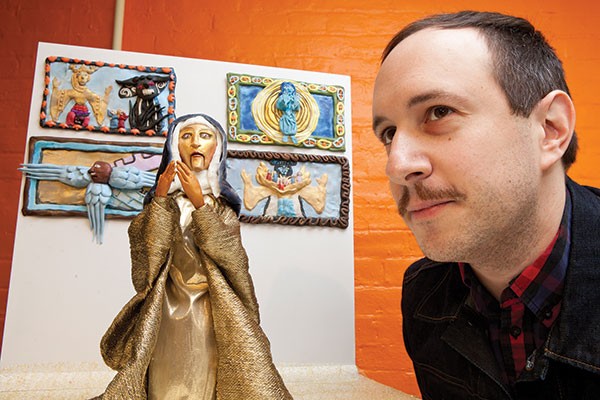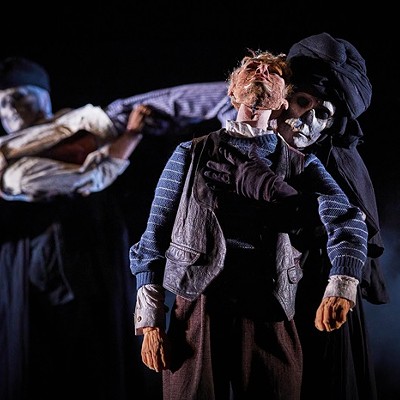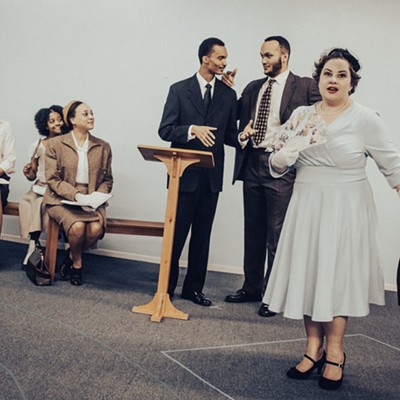Alexis Gideon grew up in Manhattan, playing guitar in the All City Jazz band and laying the groundwork for his career as a composer and musician. But Gideon traces his interest in visual art to childhood visits to the Whitney Museum of American Art. The museum housed "Calder's Circus," Alexander Calder's toy theater peopled with a ringmaster, trapeze artist, lion, lion-tamer and more, all made of wire, wood and metal — a dozen tiny mechanical puppets.
The tabletop world of bent-wire beings moved young Gideon. "It was like looking at a memory I didn't have," he says. "A lost world."
Now Gideon creates lost worlds himself. The internationally known, Pittsburgh-based artist's fourth video opera, "The Crumbling," gets its world premiere this week at the New Hazlett Theater. The 21-minute show features handmade, stop-action-animated figures enacting a darkly surreal story projected onscreen while Gideon provides most of the eclectic soundtrack live. "It's unlike anything I've seen," says Rene Conrad, executive director of the New Hazlett.
Gideon, 34, attended Wesleyan University, studying under famed avant-garde musician Anthony Braxton. He later spent several years as a touring musician. In 2008, Gideon made the first of his "Video Musics" series of short animated films based on literary or folk sources. "Video Musics II: Sun Wu-Kong" (2010), for instance, was based on an epic 16th-century Chinese novel. "Floating Oceans" (2012) was inspired by the works of Irish writer Lord Dunsany and "the time and dream experiments of the Irish physicist John William Dunne."
Gideon, a cinephile, had long wanted to combine visuals and narrative with his music. Plus, adding disciplines gave him more material to work with — more opportunities to blend genre. "All of my work was about trying to take disparate things and make them a unified personal voice that makes sense," Gideon says.
On "Floating Oceans," his collaborators included writer Jacob Rubin and Cynthia Star, an artist whose credits include big-budget animated features Coraline and Paranorman. (Both also contributed to "The Crumbling.") Gideon got bookings to perform "Floating Oceans" around the country and overseas, from the New Museum of Contemporary Art, in Manhattan — where his work was paired with that of famed South African artist and animator William Kentridge — to Berlin's HBC Gallery. And last year, "Floating Oceans" was featured on Vdrome, a prestigious online showcase for art videos based in Milan, Italy. In an email, Vdrome's Andrea Lissoni said she and her colleagues "all agreed about [the video's] intensity, complexity and, in the end, authenticity."

In 2013, Gideon moved from Portland to Pittsburgh. He had performed all three Video Musics here, at venues ranging from Lili Coffee Shop to the Carnegie Museum of Art's International Apartment Space. Like many newcomers, he was drawn by Pittsburgh's cost of living and arts community.
"He's really becoming a force in the contemporary art world. It's pretty incredible that he decided to live here," says Casey Droege, an Art Institute of Pittsburgh professor who's known Gideon since his Chicago days and who worked on costume fabrication for "The Crumbling."
Another draw, Gideon says, was the funding available here for artists. Indeed, after he moved here, he and the New Hazlett successfully applied for a $35,000 Investing in Professional Artists grant, awarded jointly by the Heinz Endowment and the Pittsburgh Foundation. The funds covered the year-long production of "The Crumbling" (stop-action being a painstaking trade). His workspace, in the theater's basement, was a short walk from his North Side home.
"The Crumbling" is set in a city whose buildings are mysteriously disintegrating. Its protagonist is an unassuming apprentice librarian who, seeking to save her town, has a series of surreal encounters with historical figures who explicate cabalism, alchemy and other arcane philosophies. Gideon says a key theme is the loss of the mystical power of language in our culture. The characters are all 11-inch-tall polymer clay figurines molded on armature wire. In spite of this, or perhaps because of it, the visuals — a desert castle, a lion eating the sun — are often stunning.
Accompanying the film, Gideon plays electric guitar and keyboards, activating electronic beats and singing or rapping all the characters' voices in his surprisingly deep, gravelly voice. The lyrics are dense with cryptic information. As the hermetic philosopher Hermes Trismegistus informs the librarian: "Everything the All / The All is Everything / Truth like metals malleable / Pendulum's infallible / Rhythmic shifts lift vibrations to higher elevations."
The performance's 21-minute running time will be augmented with a post-show Q&A with Gideon and a lobby exhibition incorporating figurines from the film and related photos. "The Crumbling" is already booked at museums in Cleveland, Boston, San Francisco and Chicago.
Despite its brevity, Gideon acknowledges that "The Crumbling" is a lot to absorb. But he enjoys challenging audiences: "I want it to kind of wash over the viewers in a way that feels like a dream."














